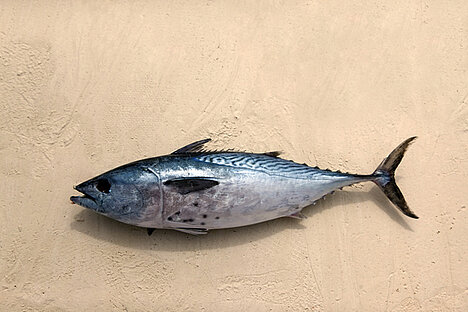Tuna

What is tuna?
Tuna is a large, fast and powerful fish that can be found in all the world's oceans. It belongs to the mackerel family and can grow up to three meters long and weigh 600 kilograms. Tuna is mainly caught and processed for its tasty and protein-rich meat. It is available in various forms, for example fresh, frozen, smoked or canned.
What are the benefits of tuna for dogs?
Tuna can have health-promoting properties for dogs. It can promote good blood circulation and support the cardiovascular system1. It is high in protein and low in fat, which is good for your dog's muscles and coat. It is also rich in omega-3 fatty acids, which have an anti-inflammatory effect and can strengthen the immune system2. Tuna also contains vitamin D, which is important for bone formation and metabolism.
What are the disadvantages of tuna for dogs?
Tuna can also be harmful to dogs, especially if it is fed too frequently or in the wrong form. Tuna can contain high levels of heavy metals such as mercury, which can accumulate in the body and lead to poisoning. Canned tuna often contains high levels of oil and sodium, which can lead to stomach upset, diarrhea and vomiting. Tuna can also trigger allergies or intolerances, which can manifest themselves in skin rashes, itching or breathing difficulties.
How do I feed my dog tuna?
If you want to feed your dog tuna, there are a few things you should bear in mind. Tuna should only be given as an occasional treat or as a supplement to their normal food, not as their main food. It should always be fresh or well cooked to avoid bacteria and parasites. Canned tuna should only be soaked in water, not in oil or brine. The can should be rinsed well before opening and the tuna well drained. You should only give your dog small amounts, for example one to two teaspoons per day for a small dog or one to two tablespoons for a large dog. You should always monitor your dog's reaction and consult a vet immediately if there are any signs of discomfort or allergy.
Tuna is a large fish, rich in protein and omega-3 fatty acids, which can be beneficial to dogs' health. It promotes blood circulation, supports the cardiovascular system, helps build muscle and strengthens the immune system. However, excessive consumption can lead to mercury poisoning and canned tuna can cause stomach upset. It should only be fed occasionally and in small quantities as a supplement to the main diet, always fresh or well cooked and preferably soaked in water rather than oil. The dog's reaction should be closely monitored.
If you notice any signs of hypersensitivity or poisoning in your dog, you should see your vet immediately. We are not a substitute for a vet, but we try to be as accurate as possible. Every dog reacts differently and we recommend you get a second opinion or consult your vet if in doubt.
Stay healthy and take good care of your four-legged friend!😊